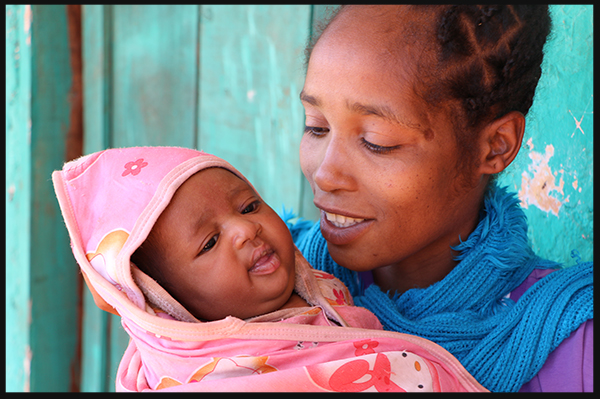Community Initiatives lead the way in fighting harmful traditional practices

“On November 22 around 8.00 in the morning, I had my first contraction. I immediately told my sister. We started walking to the farmland of my baby’s father to claim fatherhood for my unborn baby. It was the toughest time of my life. I thought I would die on my way. When we approached his farmland, I could not walk so I crawled like a baby. As soon as I reached his land, my sister assisted me and I gave birth to my baby girl”. This is Asnakech Areze, 20, talking about how she had her first baby.
Asnakech lives in Ketele Kebele of Gamo Gofa Zone. Despite the advice from the Kebele Health Extension Worker and the Kebele Command Post, she decided to have her baby in a farmland because of the traditional belief that if a woman got pregnant out of wedlock, her child would be considered fatherless unless she gave birth at her baby’s farmland. After she had her daughter, the strengthened Kebele Command Post members who followed her closely during her pregnancy took them both to the nearby health center for an early Post Natal Care, which they convinced her, is critical for the life of the mother and newborn. Her daughter Tibibir is now seven weeks old.
Meselech is Health Extension Worker in the heath post. She told us the Strengthened Kebele Command Post is teaching the community about maternal and newborn care. It identifies pregnant woman in the Kebele and refers them to the health post for antenatal care at Ketele Health Post. Before the Kebele Command Post was strengthened to include more community representatives and started focused work on MNCH, on average 13 mothers received antenatal care per month. Now, Meselech says she provides Antenatal care for 29 mothers.
“In June 2016, the Kebele Command Post identified Asnakech as pregnant woman,” says Meselech. “They informed her to start antenatal care at the health post near her house. When I met with Asnakech for the first time, she was not happy about her pregnancy because she got pregnant out of wedlock. I provided her counseling and antenatal care”.
In addition to the Kebele Command Post, we also learned a renowned Church Minister is now teaching the community that health workers treat children and mothers using knowledge created by God and that they must stand against harmful traditional practices that forces pregnant women to deliver outside health facilities. The Minister also told us he invites Health Extension Workers to the weekly church sermon to teach the community about maternal and newborn health.
Meselech is glad to see the community is showing quick change in attitude through this strengthened Kebele Command Post structure. This has motivated her to work hard and serve her community better.
Since October 2014, Save the Children has been implementing a- three -year program funded by USAID on Maternal and Child Survival Program (MCSP) Community Based Newborn Care (CBNC) - Newborns in Ethiopia Gaining Attention (NEGA) (MCSP CBNC-NEGA). Improved community maternal and newborn health practice and care-seeking behavior is one of the intermediate results of the programme.
Available service delivery data in Ethiopia indicates low uptake of maternal, newborn and child health service. To improve this, the programme uses existing community platforms including Health Development Army network, Pregnant women conferences and Kebele ommand Posts. Kebele Command Posts are identified by the program as having central role in the demand creation process.
Currently, the Kebele Command Post in Asnakech’s Kebele is working hard against this harmful traditional practice. It has 25 members selected from the community including Health Development Army, religious leaders and interested groups and women on top of the formal Kebele Command Post.
 Ethiopia
Ethiopia